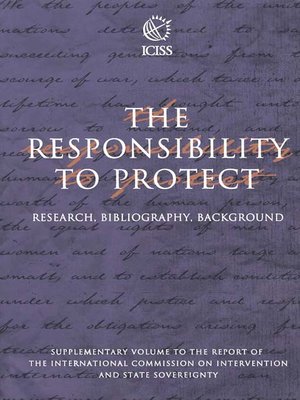Responsibility to Protect
ebook ∣ Report of the International Commission on Intervention and State Sovereignty
By International Commission on Intervention State Sovereignty

Sign up to save your library
With an OverDrive account, you can save your favorite libraries for at-a-glance information about availability. Find out more about OverDrive accounts.
Find this title in Libby, the library reading app by OverDrive.



Search for a digital library with this title
Title found at these libraries:
| Library Name | Distance |
|---|---|
| Loading... |
The international community faces no more critical issue currently than how to protect people caught in new and large-scale humanitarian crises — humanitarian intervention has been controversial both when it has happened, as in Kosovo, and when it has failed to happen, as in Rwanda. While there is general agreement internationally that we should not stand by in the face of massive violations of human rights, respect for the sovereign rights of states maintains a central place among the principles governing relations between states.
In his Millennium Report to the United Nations General Assembly, Secretary-General Kofi Annan challenged the international community to address the real dilemmas posed by intervention and sovereignty. The independent International Commission on Intervention and State Sovereignty (ICISS) was established by the Canadian government in September 2000 to respond to that challenge.
After a year of intense worldwide consultations and debate, the Commission now presents its path-breaking report. With its central theme of the “responsibility to protect,” the report underlines the primary responsibility of sovereign states to protect their own citizens from avoidable catastrophe — from mass murder, from large-scale loss of life and rape, from starvation. But when they are unwilling or unable to do so, that responsibility must be borne by the broader community of states — there must be no more Rwandas or Srebrenicas.
This volume, written by Thomas G. Weiss and Don Hubert with input from an outstanding group of international specialists, is a companion to the Commission’s main report. It represents a comprehensive, balanced and up-to-date summary of the key political, ethical, legal ,and operational issues and will be of particular interest to scholars. It also contains an exhaustive, thematic bibliography.







